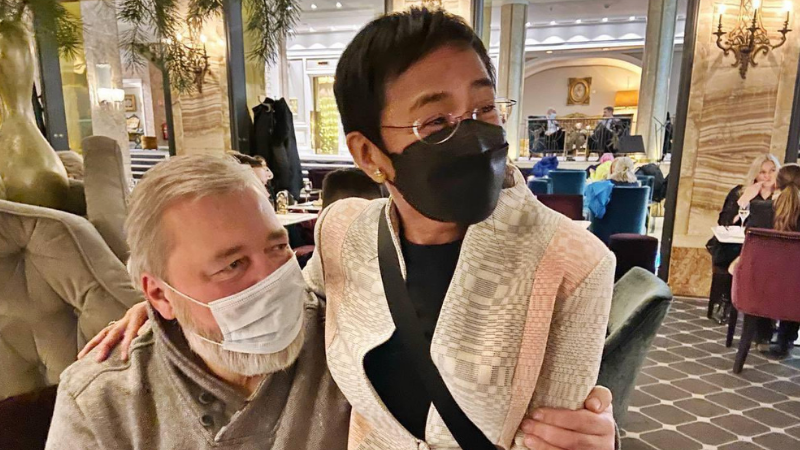The work of two investigative journalists, Maria Ressa from the Philippines and Dmitry Muratov from Russia, was acknowledged by the Nobel Peace prize committee following a ceremony held yesterday in which both received the award for their work in a climate of increasing repression of the media.
Ressa, who was almost held back from travelling to Oslo by The Philippines’ government, gave a particularly well-received speech appealing to the world to “hold the line” against authoritarian regimes seeking to stifle press freedom.
Referring to the multiple death threats she has faced as well as the 10 arrest warrants issued by the Philippines’ government in her regard, Ressa spoke of how the charges she is facing could lead to up to 100 years of jail time.
“The more I was attacked for my journalism, the more resolute I became. I had first-hand evidence of abuse of power. What was meant to intimidate me and Rappler only strengthened us,” Ressa said, referring to the independent news portal she manages. Ressa is the CEO of Rappler.
Ressa’s speech directly referred to the brutal assassinations of Saudi Arabian journalist Jamal Khashoggi and Maltese journalist Daphne Caruana Galizia as well as the forced abduction of Belarusian journalist Roman Protasevich as key examples of the worsening climate of press freedom across the world.
Just 36 hours before she received the award, Ressa also spoke of how she was informed of the killing of one of her former colleagues, Jess Malabanan. Besides highlighting the need to “hold the line” against authoritarian governments, Ressa also took aim at social media giants whose algorithms “pit us against each other” and enable the rise of authoritarian governments.
“In order to be good, we have to believe there is good in the world. The destruction has happened. Now it’s time to build – to create the world we want,” Ressa said.
Muratov, co-founder and editor-in-chief of Novaya Gazeta, spoke of how the world “has fallen out of love with democracy”.
“As governments continually improve the past, journalists try to improve the future,” Muratov said, referring to how critical, independent watchdogs are essential for progress.
“Yes, we (the journalists) growl and bite. Yes, we have sharp teeth and a strong grip. But we are the prerequisite for progress. We are the antidote against tyranny,” Muratov added.
Speaking to reporters outside the Novaya Gazeta newsroom, Muratov dedicated the award to the paper’s “fallen” journalists who “gave up their lives for their profession”.
The prize, he added, should have gone instead to jailed Russian dissident Alexei Navalny – widely regarded as President Vladimir Putin’s most formidable critic, who was jailed in January upon his return to Russia after he was poisoned and transferred to Germany for medical treatment.
Reactions from all corners of the world poured in on Twitter, with many praising the journalists’ work as an example to be followed in the fight for press freedom across the world. Press freedom organisations like the International Press Institute congratulated Ressa and Muratov on being awarded the Nobel prize, hailing the moment as “a great day for press freedom”.
Today is #NobelPeacePrize day 🏅We're elated that this year's prize goes to @mariaressa and Dmitry Muratov, who have dedicated their careers to fighting for independent journalism. A great day for #pressfreedom.#CongratsMariaRessa #CongratsDmitryMuratov pic.twitter.com/hpLthcKFgY
— IPI – The Global Network for Independent Media (@globalfreemedia) December 10, 2021
Reporters without Borders’ international campaign coordinator Rebecca Vincent said that while she was “delighted” for Ressa and Muratov, she was “furious about the blow to journalism which the Assange extradition ruling represents”, referring to how Wikileaks’ founder Julian Assange is set to be extradited to the US where he is facing life in prison on espionage charges.
After the announcement on Friday, the United Nations’ human rights office congratulated Ressa and Muratov on receiving the prize, saying it was “recognition of the importance of the work of journalists in the most difficult circumstances”.














